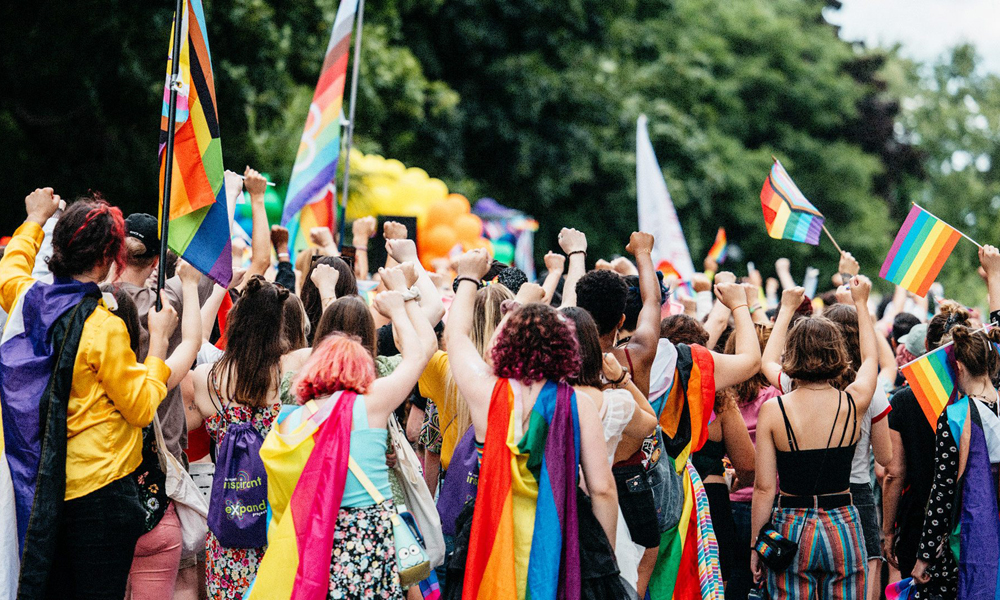We can no longer accept a system that refuses to accommodate the fullness of the people it is meant to serve…
By Tyler Boyce
According to data released by Statistics Canada earlier this year, police-reported hate crimes targeting 2SLGBTQI+ communities have increased by 64% since 2021. A record high increase. As Canada continues to grapple with a growing wave of hate crimes, particularly against marginalized communities, it has become increasingly clear that a multi-faceted approach is needed to tackle this issue. One key element of this approach is intersectionality, an idea that has gained significant traction in recent years within Canada’s 2SLGBTQI+ movement and beyond.
When people visualize Canada’s queer movement, they often imagine white, cisgender, able-bodied, high-income men. This picture is also held by policymakers, philanthropic foundation leaders, and unions – and it results in progressive movements being unequipped to support Canada’s 2SLGBTQI+ movement at a time when we need them most.
I am not only the Executive Director of the Enchanté Network, Canada’s largest network of 2SLGBTQI+ organizations, but I am also a Black queer person – and my vision is one of progressive movements where no one is left behind.
Intersectionality is a concept coined by Dr. Kimberlé Crenshaw that recognizes the complex interplay of different forms of oppression, including those related to race, gender, sexuality, religion, and ability. It acknowledges that people experience these forms of oppression simultaneously and that these experiences are interconnected.
A heightened risk of experiencing hate crimes
Intersectionality is particularly important in the context of the 2SLGBTQI+ community, as many individuals identify with multiple marginalized identities. For example, a queer or trans person may also be Black or Muslim, which can compound their experiences of discrimination and prejudice – and heighten their risk of experiencing a hate crime.
In recent years, there has been a growing awareness of the importance of intersectionality in the fight against hate crimes targeting Canada’s 2SLGBTQI+ communities. As hate crimes against this community continue to rise, it has become increasingly clear that these crimes intersect with growing hate crimes against Black and religious communities, who are also part of the 2SLGBTQI+ community. In the same data released by Statistics Canada this year, we saw hate crimes targeting religion and race also spike.
For example, in the wake of the deadly shooting at a Quebec City mosque in 2017, there was a significant increase in reported hate crimes against Muslim individuals, including those who identify as LGBTQI+. Similarly, during the pandemic, there has been a surge in anti-Asian hate crimes, which also impact queer and trans Asians.
Urgent need for a coordinated approach
This intersectionality highlights the urgent need for a coordinated approach to tackle hate crimes against all marginalized communities. This approach must recognize the interconnectedness of these issues and work to address them in a comprehensive manner.
One key step in this direction is to ensure that intersectionality is integrated into all aspects of Canada’s 2SLGBTQI+ movement. This includes advocating for policies and programs that are inclusive of all marginalized communities, as well as fostering dialogue and collaboration between different communities and organizations. This is why the theme of the Enchanté Network’s upcoming annual conference this Fall is ‘coalition building’. We can no longer accept a system that refuses to accommodate the fullness of the people it is meant to serve.
Another important step towards embedding intersectionality into our collective approach to combatting hate crimes against queer communities is to prioritize the voices and leadership of those who are most impacted by hate crimes. This includes Black and religious queer and trans individuals, who have been at the forefront of intersectional activism in Canada.
As we continue to grapple with the devastating impact of hate crimes in Canada, it is crucial that we recognize the importance of intersectionality in the fight against all forms of oppression. By working together, we can build a more just and inclusive society for all – not just those who most mirror what power already looks like in this country.
TYLER BOYCE is a nationally recognized human rights activist and the executive director of the Enchanté Network, Canada’s largest network of 2SLGBTQI+ organizations. He is also an adjunct professor in the University of Ottawa’s Faculty of Law, where he teaches Deconstruction of Racism in the Law. In 2022, he was recognized as one of Future of Good’s 30 Young Impact Leaders To Watch. His leadership is grounded in Black Queer Feminist Thought, Queer Theory and a commitment to bridging the worlds of research, public policy and social justice.







POST A COMMENT